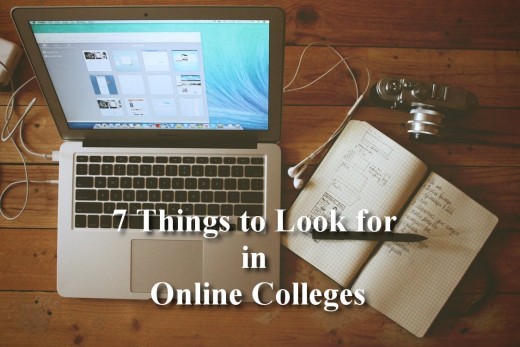My Online College Experience, and 7 Things to Look For When Enrolling

There are few things as effective as increasing you level of education when trying to increase your yearly income, so it comes as no surprise that online colleges have quickly become one of the most popular ways to better yourself in the past decade. The allure of flexible scheduling and not having to travel are surely to blame for such rapid expansion. But unfortunately, when an industry grows at that pace, it inevitably gets saturated with people just looking to make a buck by providing less than stellar services. Or even worse just a flat out scam! So if you are looking for a great online college experience then take a listen to what I have to say. I've been there.
My Online College Experience
Back in 2007 I wasn't exactly looking to go to college. I suppose you could say that I wasn't interested in the idea of traditional education. But push came to shove, and I ended up enrolling at DeVry. They didn't exactly have my major on site, so I was supposed to take a hybrid of sorts in my online college experience.
I took some of the general education on site, and took my programming classes online. This gave me a unique insight into both what their regular classes were like, and what it was like to go online. For me it was an easy choice. After about two semester I quit going to campus all together, and instead worked from home.
I found most of the teachers to be responsive, and the majority of the coursework was simple enough to do with the books in hand. Though, the few times that I was pushing a deadline were pretty catastrophic. Professors, as it turns out, have their own lives, and as a result, are not always at your beckon call. This led to several assignments getting docked points for being late. Though I should add, that I never had an assignment fully discredited for being late because of this.
As for actually learning the material, I had no problem learning what I needed to from the books and lectures that came with the courses, though if you are the kind of person that needs some hands on instruction, I could easily see you having difficulty unless you are on the same schedule as the instructor. With that in mind, there were always set times in the week that they would be available in a class chatroom.
I suppose the absolute worst part of the whole online college experience were group projects. These can already be a nightmare, and when you give people no real face time, and little accountability, the results can be disastrous. I wound up getting a bad grade in a class because we weren't able to work out our differences and get our project done, although I did still pass.
After having been through it, I can safely say you need to look at this list I compiled. It's got all the questions you want to ask before you enroll yourself in an online college.
First, here's a video that lays out a few of the more reputable online colleges.
1. Are they Accredited?
I chose this first because it is simply put, the most important factor. Having the correct accreditation is the difference between your degree meaning a new career, and it not being worth the paper that it’s printed on. The issue is that it is entirely possible to set up an educational institution without having done anything to assure the quality of the degree. There are even companies which sell degrees without you having to do any work at all. These degree mills are practically worthless as any research into whether or not you attended a real college will ultimately reveal the truth. It doesn’t end there though, because without having a standard of education, an online college can say that you have a valuable degree even if they all they taught was outdated material and bad business practices. So don’t ruin your online college experience, and especially don't waste your money if they are not accredited.
Have you considered continuing your education online before?
2. Are Their Classes Readily Available?
Whether or not their classes are ready for you to take them may not seem like that big of a deal, but think about it this way, each degree of course has requirements that must be fulfilled. Now let’s say you have to take their math course in order to be able to go on to your next classes. But what if they only have one math teacher? And say he only teaches the class you need once every four years, well then it could be four years before you can even get your prerequisites done!
Granted, this is kind of an exaggeration, and math tends to be a regular subject, but there really are classes which are only available maybe once every two years in some online colleges. I know when I was in college our final project classes were only available every other semester, which for me meant I had a semester off while I waited to get in the class (it was kind of nice to take a break seeing as I was regularly doing 18 units a semester). So keep this in mind when you are looking at their course catalog, because your online college experience might just take a little longer than expected.
3. How Long Have they Been Around?
The wild west of online colleges is mostly over, and the good ones have typically been around for at least five years. Which should be a very important factor in your decision process. The reason for this is simple, they have had time to work out the kinks in their system.
Starting a new online college can be daunting to say the least. They not only have to build or purchase software to run the classes, but also have the teachers well acclimated to it. New colleges therefore are usually ripe with technical and instructor issues, which can go on for months, and wreak havoc on your online college experience. And if you pick an online only college, then chances are you can’t even go see the instructor to try and straighten things out.
If you think failing a class sucks, then imagine failing a class because some technical issue kept you from submitting your homework from day one! Yeah, it can be ugly. So take this advice, and stick to one that is at least 5 years old or more. It may mean you have to cut your list of schools down a little, but trust me, it's worth not having to deal with the hassle.

4. Are they Flexible?
Everyone loves the idea waking up at noon, rolling out of bed in their pajamas, having some breakfast, then getting around to their class work when they feel like it. But that is not always the case. There are plenty of online colleges out there which have strict schedules for when you have to be in class (or rather group chatting), and a big part of your grade can come from that time. In other words, don’t go into this thinking that every one of them is going to let you keep control of your schedule, because a great deal of them don’t allow this.
Still even with scheduled meetings, you can have a lot of flexibility in other ways. Some institutions allow students more of a work at your own pace kind of scenario, where you are given assignments with due dates long in advance (which I suppose can be a problem for some procrastinators out there). Although to find out that information you would probably actually have to talk to someone who went to the school you are considering.
5. Do they Offer Career Placement Services?
You may or may not have this one on your list of important things, but it’s still nice to have either way. I would say if you are on the fence about which one I was going to attend, and one had great career services, and the other did not, then definitely pick the one that does.
Once you graduate you are most likely going to want a job. And seeing as most companies only hire from people they already know, it’s a good idea to have some people willing to share their network with you. Plus they are also pretty good at it. Their job is to be connected to the higher-ups and hiring managers at companies which are looking for your talent, so if your college has renown for its career services, it can definitely be a boon to your post-graduation job hunt. And trust me, not being able to get a job is going to put damper on your online college experience.

6. How is their IT Department?
Here’s one you may not even consider for a traditional institution, but for your online college experience to be good it’s a must. Having a good IT department is the difference between having technical problems fixed in minutes, and waiting days to be able to log into your account again. Believe me, you don’t want to be locked out when that paper worth half of your cumulative grade is due!
It’s also worth noting that it goes both ways, teachers often have problems when they are connecting online, and as a result good IT services means more responsive instructors.
7. Are their Online Resources Robust?
Any reputable college has a library, computer labs, and maybe even a pool. Well until they can find a way to put a pool online you’re going to have to settle for them having good digital resources. Because a lot of online colleges also have brick and mortar establishments, it’s important to realize that not all of their services may be online. For example they may have great career placement, but only to students who frequent their campus. Take the time and make sure that what they advertise for students, applies to online students as well. It could save you from some nasty surprises down the road.
These are definitely the hallmarks of great online college experience, and while some of them are going to be easy to find, keep in mind that a councilor is not likely going to tell you if their IT department isn’t quite top-notch. Chances are you are going to want to dig around and ask some alumni what it took to graduate, because you can be sure if they had problems, then you probably will too. The good news if you know what to look for in an online college, you'll have a much easier time finding one that fits you.








